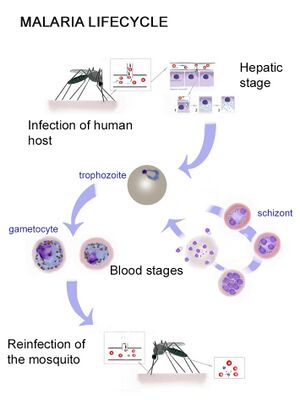Overview of malaria biology: Difference between revisions
From haematologyetc.co.uk
(Created page with "Malaria-Lifecycle.jpg") |
No edit summary |
||
| (5 intermediate revisions by the same user not shown) | |||
| Line 1: | Line 1: | ||
Malaria-Lifecycle.jpg | ---- | ||
'''Navigation'''</br> | |||
<span style="font-size:80%">(click blue highlighted text to return to page)</span></br></br> | |||
<span style="font-size:90%">[[Malaria Index|Malaria main index]]</span></br> | |||
<span style="font-size:90%">>[[Malaria Biology|Basic malaria biology]]</span></br> | |||
<span style="font-size:90%">>>This page: <u>''Pre-erythrocytic (liver) stage</u></span> | |||
---- | |||
{| class="wikitable" style="border-style: solid; border-width: 5px; border-color: #023020; color:black" | |||
|colspan="1" style = "font-size:100%; color:black; background: #afbddb |'''Overview of malaria lifecycle''' | |||
|} | |||
The lifecycle of malaria is shown below moving from the mosquito (the innocent bystander) to mammal host (the victim) the back again - this has been made small for mobile users but click on the image for a size version. | |||
Each of these stages including the pre-erythrocytic and re-infection stages have clinical and often morphological relevance - these are described in the other links in the section, they don't take long to read and hopefully you will find them useful! | |||
---- | |||
<gallery mode="nolines" widths=300px heights=400px> | |||
File:Malaria-Lifecycle.jpg|<span style="font-size:90%">''Infection of the mosquito''</span>|link={{filepath:Malaria-Lifecycle.jpg}} | |||
</gallery> | |||
---- | |||
Latest revision as of 17:16, 25 April 2024
Navigation
(click blue highlighted text to return to page)
Malaria main index
>Basic malaria biology
>>This page: Pre-erythrocytic (liver) stage
| Overview of malaria lifecycle |
The lifecycle of malaria is shown below moving from the mosquito (the innocent bystander) to mammal host (the victim) the back again - this has been made small for mobile users but click on the image for a size version.
Each of these stages including the pre-erythrocytic and re-infection stages have clinical and often morphological relevance - these are described in the other links in the section, they don't take long to read and hopefully you will find them useful!
